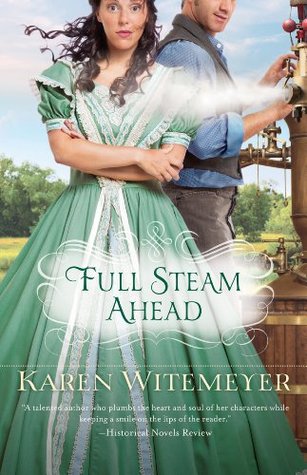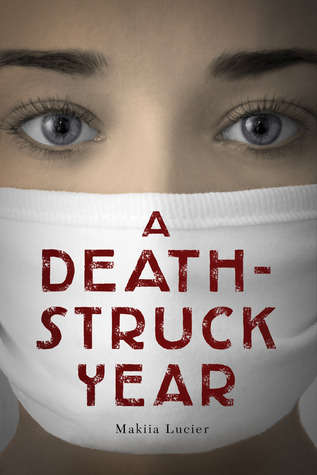 Full Steam Ahead
Full Steam Ahead
by
Karen Witemeyer (Goodreads Author)
When Nicole Renard
returns home to Galveston from an eastern finishing school, she's
stunned to find her father in ill health. Though she loves him, he's
only ever focused on what she's "not." Not male. Not married. Not able
to run their family business, Renard Shipping.Vowing to secure a suitable marriage partner, Nicole sets out with the Renard family's greatest treasure: a dagger personally gifted to Nicole's father by the pirate Jean Lafitte. Many believe the legend that the dagger is the source of all Renard Shipping's good fortune, though Nicole is sure her father's work ethic and honorable business practices are the keys to their success. Before she can board the steamer to New Orleans, Nicole finds her father's rivals—the Jenkins brothers—on either side of the gangplank, ready to grab her and steal the dagger. Quickly, she decides to instead travel north, to Liberty, Texas, where she can decide what to do next.
Darius Thornton needs a secretary—someone to help him get his notes in order. Ever since the boiler explosion aboard the "Louisiana," Darius has been a man obsessed. He will do anything to stop even one more steamship disaster. The pretty young socialite who applies for the job baffles him with her knowledge of mathematics and steamships. He decides to take a risk and hire her, but he's determined her attractive face and fancy clothes won't distract him from his important research.
The job offer comes at exactly the right time for Nicole. With what Darius is paying her, she'll be able to afford passage to New Orleans in mere weeks. But Mr. Thornton is so reclusive, so distant, so unusual. He can create complex scientific equations but can't remember to comb his hair. And his experiments are growing more and more dangerous. Still, there are undeniable sparks of attraction between them. But Nicole is leaving soon, and if she marries, it must be to a man who can manage a shipping empire. Darius certainly doesn't fit that description. And the Jenkins brothers have not given up on kidnapping Nicole and seizing the Lafitte dagger for themselves.
My Review: 7/10
I'm a fan of Karen Witemeyer, but this one fell just a little short for me.
It was still a page-turner, still captivating, from the very first words to the very last. And I really loved the first half of the book. Nicole was intelligent, strong, and sassy, but with some understandable insecurities of her own. Darius was confident and lovable in his mania. I liked the way he respected her and treated her as his partner, his equal.
But some details didn't add up. Nicole's mother's parting words were to choose the right man for her, not her father's business, yet she talked herself out of Darius being the right choice. I got the impression that her father wasn't as concerned with someone with loads of shipping experience, so much as some brawn to protect the family. So I was a little confused as to why Nicole was so adamant on that point.
Despite references to God and scripture, and despite Nicole praying for God to direct her path and lead her to the right man, she did not turn to God when she realized she'd fallen for Darius. She tried to blaze ahead on her own, which almost ended in disaster. I thought this was an excellent portrait of the way we try to solve our problems without God- thinking that if He didn't respond in the way we wanted, He just must not be listening. In her broken relationship with her father, I would have loved to see Nicole turn to her Heavenly Father for love and acceptance, and through Him, finally believe that she is enough and loved as is. Then, to see her step out in faith, trusting God to have worked everything for her good, without having to see proof of it first. These characters were human and relatable, but sometimes I want ones that inspire me, that make hard choices and encourage me to do the same.
I was also surprised at the amount of time spent fantasizing about or pursuing physical things- looks, touches, kisses, etc. It took up a decent amount of pages and more of the relationship than I was expecting.
I loved the historical aspects and Darius' struggle to face his obsession and turn it over to God. I thought that was really well done. I'd recommend this book to fans of this genre and fans of this author.


